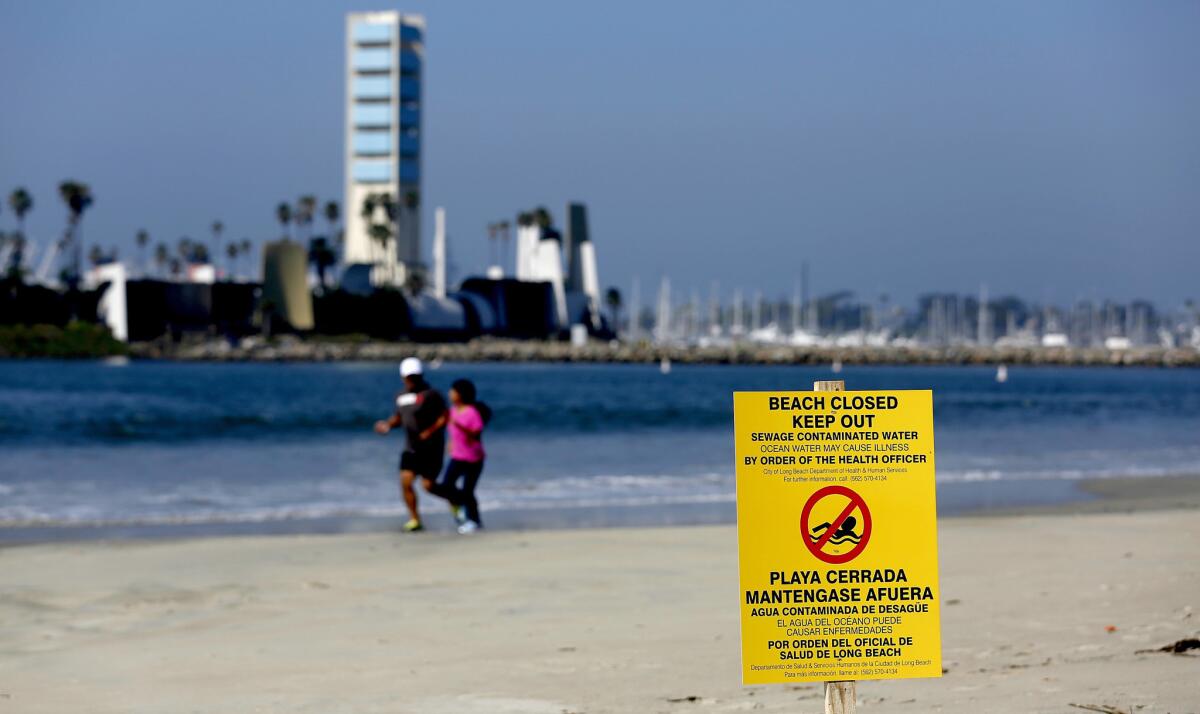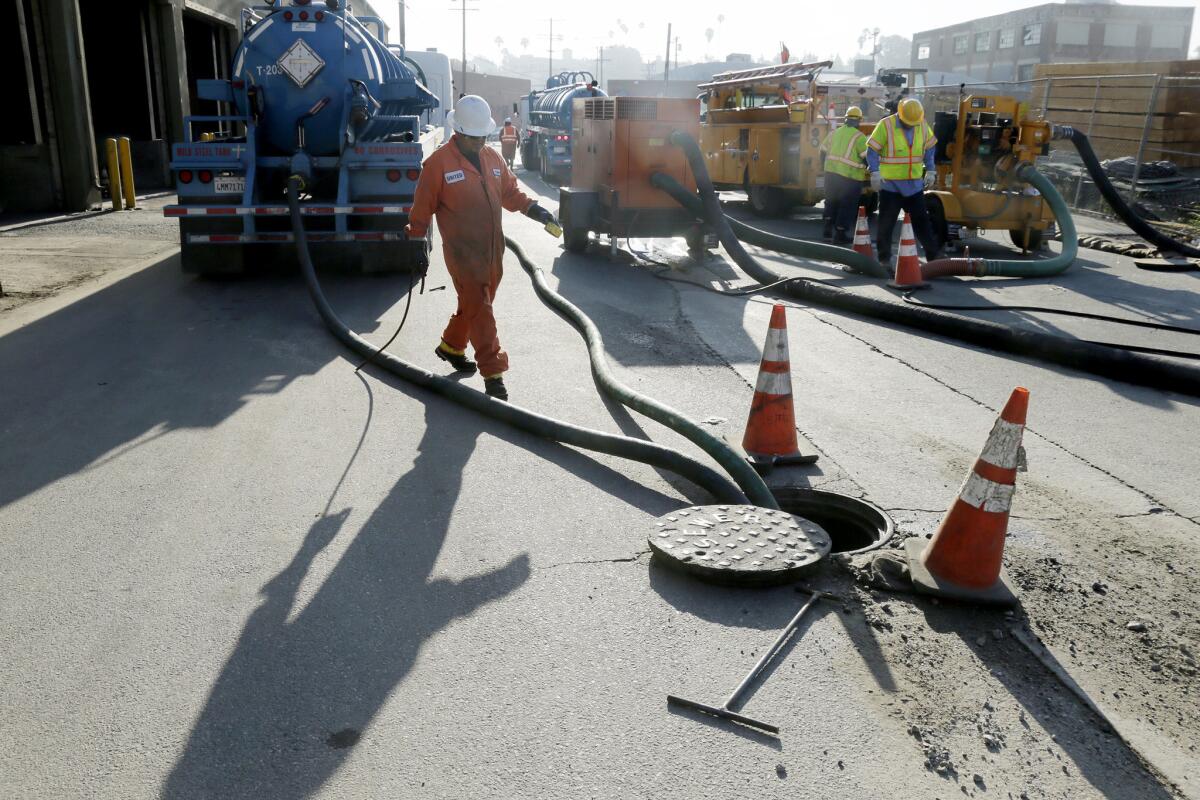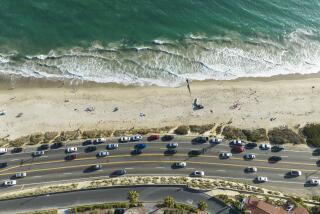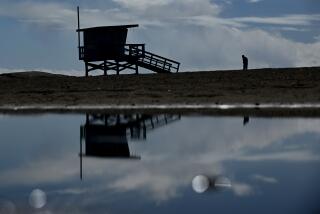Sewage spill in L.A. grows to 2.4 million gallons, prompting bans on swimming in Seal Beach and Long Beach

- Share via
A damaged sewage line spilled a total of about 2.4 million gallons of untreated waste into the Los Angeles River and has forced the closure of all beaches in Long Beach and Seal Beach, officials said Tuesday.
The sewage line began leaking Monday about 2 p.m. and was stopped late that night, but the cracked pipe split again Tuesday as repairs were underway, said Tonya Durrell, a spokeswoman for the City of Los Angeles Department of Public Works.
The overflow, which occurred near 6th Street and Mission Road in Boyle Heights, was fully stopped Tuesday afternoon, Durrell said.
Officials said the top of a 5-foot sewer pipe collapsed, sending debris into the pipe. The clog then caused the sewage to overflow.
The spill sent millions of gallons of waste into the river, a 51-mile waterway that snakes through Los Angeles County, ending in Long Beach. Using pumps, workers were able to capture about 750,000 gallons of sewage before it reached the river, Durrell said.
Officials don’t know what caused the break, but the large sewer line was built in 1929, said Adel Hagekhalil, assistant director of Los Angeles Sanitation.
“This happening is just a part of the maintenance system,” Hagekhalil said. “Something grows old, you have to repair it or replace it.”
Sanitation workers on Tuesday installed a permanent bypass system to divert the flow of waste around the old pipe. Crews were working to mend the damaged pipe and expected to complete repairs by late Thursday, Durrell said.

In addition to the foul stench, the deluge of waste posed health risks.
The untreated sewage — rife with bacteria and possibly viruses — could lead to eye, ear and throat infections, health officials said.
Dr. Mauro Torno, the acting health officer for Long Beach, decided to shut down swimming along the coast until tests show the water is safe. Officials asked the public to avoid puddles of water near the spill.
Long Beach officials planned to regularly test samples of ocean water for the rest of the week to determine whether the water was dangerous to the public, said Nelson Kerr, manager of the city’s Bureau of Environmental Health.
Health officials will require at least two consecutive days of clean water samples before they decide to reopen the beaches, Kerr said. Depending on the quality of the samples, the beaches could reopen as early as Thursday.
“It’s a lot of sewage to consider,” he said. “This is a fairly large spill.”
So far, officials haven’t received any reports of waste on city beaches, but Kerr said that doesn’t mean it’s not in the ocean.
The Orange County Health Care Agency also closed Seal Beach’s shore from the mouth of the San Gabriel River to Anaheim Bay. Swimming, surfing and diving were prohibited, the county health agency said.
Although the leak was large, it pales in comparison with Los Angeles’ largest spill.
In 1998, more than 30 million gallons of sewage spilled during El Niño storms, Hagekhalil said.
“We haven’t had a large overflow in over 15 years,” he said.
“We’ve been doing very well. This was an accident but we’re investigating what happened.”
For more news in California, follow VeronicaRochaLA and @MattHjourno.
ALSO
Judge throws out ex-L.A. County Sheriff Lee Baca’s plea deal, saying six months in prison not enough
Transient sought in death of West Hollywood woman whose body was found in trash bin
Former top L.A. County attorney alleges misconduct by supervisors in new suit
UPDATES:
7:41 p.m.: This article was updated with additional details and minor editing.
5:50 p.m.: This article was updated with the closure of beaches in Seal Beach.
12:45 p.m.: This article has been updated with new spill estimates.
10:45 a.m.: This article has been updated with comments from Adel Hagekhalil, assistant director of Los Angeles Sanitation.
9:31 a.m.: This article has been updated with additional details and background.
July 19, 6:49 a.m.: This article has been updated with details on the amount of sewage spilled.
7:45 p.m.: This article has been updated with additional details about the cause of the spill.
This article was originally published on July 18 at 5:50 p.m..
More to Read
Sign up for Essential California
The most important California stories and recommendations in your inbox every morning.
You may occasionally receive promotional content from the Los Angeles Times.











